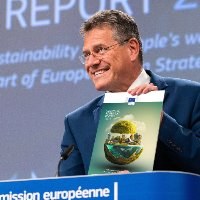(BRUSSELS) – Sustainability and people’s wellbeing should be at the heart of Europe’s strategic foresight, the European Commission said on Thursday in its 2023 Strategic Foresight Report.
With the EU engaged in a “profound and ambitious transition to achieve climate neutrality and sustainability in the next few decades”, the sustainability transition will be “key to strengthen the EU’s Open Strategic Autonomy”, said the Commission.
This will ensure its long-term competitiveness, uphold its social market economy model and consolidate its global leadership in the new net-zero economy. To succeed, the executive says the EU needs need to address several challenges and make choices “that will affect our societies and economies at an unprecedented pace and scale”.
“The Commission is putting forward an action-oriented analysis of the key challenges the EU will face as it goes through the sustainability transition,” said EC vice-president Maros Sefcovic: “This analysis reflects our focus on the wellbeing of current and future generations, and the imperative need to protect our planet. We want to keep Europe at the forefront of the sustainability transition, leveraging our unique social market economy and global trade power.”
The 2023 report provides an overview of the challenges we face and proposes ten areas for action to achieve a successful transition. To equip policymakers with economic indicators which also consider wellbeing, it proposes to adjust Gross Domestic Product (GDP) to take account of different factors such as health and the environment.
This approach will bolster the EU’s Open Strategic Autonomy and global standing in its pursuit of a resilient net-zero economy, says the Commission.
As it goes through the sustainability transition the EU is facing several challenges. For example:
- Evolving geopolitical shifts are shaping public opinion and how governments across the globe act, challenging international cooperation on global issues, such as climate change or the energy transition.
- The need for a new economic model, focused on the wellbeing of people and nature, decoupling economic growth from resource use and shifting to more sustainable production and consumption. Up to 75% of Eurozone businesses are highly dependent on natural resources. Economic, social and environmental sustainability are inextricably linked.
- Growing demand for adequate skills for a sustainable future. The availability of workers equipped with appropriate technical and soft skills will be crucial for the EU’s competitiveness: 85% of EU firms today lack staff with the competences needed to navigate the green and digital transitions.
- The sustainability transition requires unprecedented investments. Achieving it will depend on securing sufficient funding both from the public and private sectors.
The report identifies ten areas where the Commission says the EU’s policy response is needed to ensure “that the sustainability transition remains focused on the wellbeing of people and society”:
- Ensure a new European social contract with renewed welfare policies and a focus on high-quality social services.
- Deepen the Single Market to champion a resilient net-zero economy, with a focus on Open Strategic Autonomy and economic security.
- Boost the EU’s offer on the global stage to strengthen cooperation with key partners.
- Support shifts in production and consumption towards sustainability, targeting regulation and fostering balanced lifestyles.
- Move towards a ‘Europe of investments’ through public action to catalyse financial flows for the transitions.
- Make public budgets fit for sustainability through an efficient tax framework and public spending.
- Further shift policy and economic indicators towards sustainable and inclusive wellbeing, including by adjusting GDP for different factors.
- Ensure that all Europeans can contribute to the transition by increasing labour market participation and focusing on future skills.
- Strengthen democracy with generational fairness at the heart of policymaking to reinforce the support for the transitions.
- Complement civil protection with ‘civil prevention’ by reinforcing the EU’s toolbox on preparedness and response.
2023 Strategic Foresight Report webpage
2023 Strategic Foresight Report – guide



